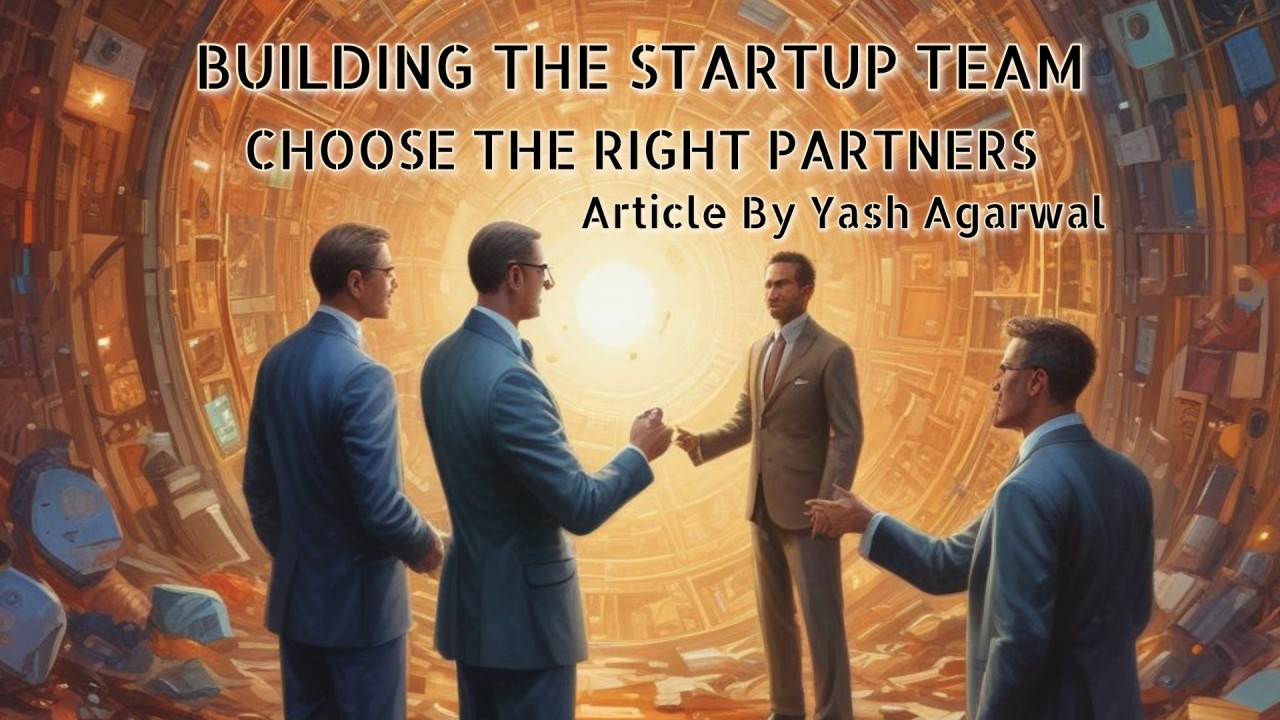Starting a business is like planting a seed with the hope that it will grow into something big and meaningful. You have a groundbreaking idea, endless passion, and the determination to see it succeed. But no matter how brilliant your concept, success hinges on one crucial factor: you can’t do it alone. Choosing the right partners, collaborators, and team members can make or break your startup, especially in its early stages.
So, who should you bring onboard? Should you collaborate with friends and family, or should you look for outsiders? In this article, I’ll walk you through the pros and cons of each option—so that you can make the best decision for your startup’s success.
🤝 Friends and Family: The Power of Familiarity
Advantages:
Bringing friends and family into your startup offers a sense of comfort, trust, and emotional support. Let’s take a look at the benefits of involving people you already know:
1. Trust and Transparency: You already know them and trust them. This can eliminate the fear of someone stealing your idea.
2. Understanding Their Strengths: You are well aware of their skills and personalities, making it easier to allocate roles in your startup.
3. Financial Investment: Family and close friends are often more willing to invest in you or lend a helping hand when needed.
4. Emotional Support: Family support can increase when they see familiar faces involved. Family and friends offer a built-in emotional safety net, sticking with you through challenges because they care about you personally.
5. Shared Vision & Loyalty: They often align with your vision and values, making them more loyal and committed to your startup’s success, even during tough times. They’re less likely to leave if things get tough, out of respect for your relationship.
Disadvantages:
While the emotional connection is strong, mixing personal and professional relationships can create difficulties:
1. Difficult to Enforce Professional Boundaries: You may find it hard to demand accountability and exert authority over friends or family, which could slow the project.
2. Joint Decision-Making: You can't always make decisions alone, emotional ties might force you to listen to suggestions that may not be beneficial.
3. Dependence and Delays: Relying on them might cause delays if they don't have the same urgency or dedication as you.
4. Financial Strains: Friends and family may not always have the financial capacity or commitment to continuously invest in your startup.
5. Strained Relationships: Business disagreements can sour personal relationships, making it challenging to balance both.
🏆 Proven Success Stories: Friends & Family Collaborations
When it comes to startup success, history is filled with examples where trusting relationships between friends or family have driven innovation and long-lasting success. Here are a few inspiring cases:
💡 Bill Gates & Paul Allen (Microsoft): "From childhood friends to tech pioneers." Gates and Allen transformed their shared passion for computing into Microsoft, forever shaping the software industry.
💡 Ben Cohen & Jerry Greenfield (Ben & Jerry's): "A friendship built on shared values and great flavors." Their bond helped them create a socially conscious ice cream empire while staying true to their principles of fairness and quality..
💡 Larry Page & Sergey Brin (Google): "Academic rivals turned co-founders." Despite early differences, their complementary skills and mutual respect led to the creation of Google, revolutionizing search and online advertising.
💡 Steve Jobs & Steve Wozniak (Apple): "A friendship that started in a garage and changed the world." Their personal connection and technical genius gave birth to Apple, one of the most iconic tech companies in history.
💡 Bill Hewlett & David Packard (HP): "The college friends who founded Silicon Valley’s first startup." Hewlett and Packard’s trust and friendship helped them establish HP, laying the foundation for Silicon Valley’s culture of innovation..
🌐 Outsiders: The Value of Fresh Perspectives
Advantages:
On the other hand, outsiders bring a fresh perspective, objective skills, and often, much-needed professional distance. Here are the benefits:
1. Clearly Defined Roles: With outsiders, you can set clear terms and expectations from the start, minimizing misunderstandings.
2. Higher Accountability: You can enforce performance standards and expect them to work as hard as you because it’s a professional relationship. You're not tied to keeping someone if they aren’t contributing.
3. Fresh Investment:: Outsiders may be more willing to invest in your startup, sometimes more heavily, because of the opportunity to contribute to something new.
4. Equity-Free Contributions: You can involve them through profit-sharing arrangements without diluting your equity.
5. Global Talent Pool: Outsiders can bring specialized expertise or skills that your friends or family may lack, and you can find the right talent anywhere in the world.
Disadvantages:
However, bringing in strangers to your startup comes with its own risks:
1. Trust Issues: You might have to reveal key details about your idea before they join, which risks them stealing or duplicating it.
2. Commitment Concerns: Outsiders might not have the same emotional connection to your project and could leave at crucial stages.
3. Coordination Challenges: Working with outsiders, especially remotely, can lead to communication and coordination issues.
4. Difficult to Assess: It's hard to evaluate someone's skill and reliability without a prior relationship, which might lead to inefficient hiring decisions.
5. Conflicts Without Mediators: With no personal ties, resolving conflicts might become more challenging.
💼 Outsider Expertise: Leveraging Fresh Perspectives
Not all partnerships are born from personal relationships. Some of the most successful companies brought in outsiders to add expertise and fresh perspectives:
💡 Sheryl Sandberg (Meta): "An outsider who transformed Facebook’s business model." Sandberg’s expertise in business operations helped scale Facebook from a growing startup to a social media powerhouse.
💡 Reed Hastings (Netflix): "An outsider who disrupted the entertainment industry."Hastings leveraged his previous experience in technology and media to transform Netflix from a DVD rental service to a streaming giant.
💡 Susan Wojcicki (YouTube): "Her strategic leadership turned YouTube into a video giant." Wojcicki was brought in to head YouTube, guiding its expansion with her expertise in online advertising and video platforms.
💡 Howard Schultz (Starbucks):"The outsider who brought a new vision to coffee culture."Schultz joined Starbucks and redefined the brand, turning it into a global coffeehouse chain known for its exceptional customer experience.
💡 Angela Ahrendts (Burberry):"A retail outsider who redefined luxury branding."Ahrendts joined Burberry and revitalized the brand, blending digital innovation with traditional luxury to attract a younger demographic.
Takeaway:
Friends & Family Approach: Personal bonds and trust have fueled some of the most successful partnerships in history, allowing co-founders to endure the challenges of early-stage startups.
Outsider Approach: Fresh perspectives and professional expertise have also been pivotal, with outsiders bringing the specialized skills necessary to scale businesses and introduce stability.
Which path will you take in building your dream team?
💡 Key Questions to Ask Before Partnering
Whether you choose friends, family, or outsiders, asking the right questions can help you make an informed decision:
1. What unique skills do they bring to the table? Ensure they complement your weaknesses and bring valuable expertise.
2. Are they as committed to the startup as you? Determine whether they share your long-term vision and passion for success.
3. How will they handle setbacks? Their resilience and attitude toward challenges can make or break your startup.
4. Can they work within your vision and company culture? Ensure their values align with your startup’s mission and goals.
5. How do they handle conflict? Assess their approach to disagreements and decision-making processes.
🔍 Critical Points to Consider When Collaborating
When making decisions about partnerships, always remember these key factors:
Mutual Trust: Trust is the foundation of any collaboration, especially in startups. Whether friends or outsiders, you need to trust them with your vision, resources, and decision-making.
Complementary Skills: Look for people who fill the gaps in your skill set. If you’re great at sales, find someone who excels in operations or tech.
Clear Terms and Conditions: Lay out all the terms early on. Define roles, expectations, and working strategies to avoid misunderstandings.
Decision-Making Authority: Decide who will have the final say. Involve others in the decision-making process but maintain leadership over core business matters..
Financial Contributions: Clarify how much each person is expected to invest and under what terms.
Exit Strategy: Do you have a clear exit plan in case things don’t work out with the partnership?
🌟 Conclusion:
Finding the right team for your startup is a balancing act. Whether you choose to work with friends, family, or outsiders, each decision comes with its own set of challenges and opportunities. The right mix of passion, skills, and dedication can propel your startup to new heights.
Remember, the greatest companies, from Apple to Tesla , all started with the right team behind them. Steve Jobs, Steve Wozniak, Elon Musk —they all relied on the strength of their teams to build iconic brands.
Ready to build your dream team? Let’s turn your startup vision into reality!
Warmest Regards,
Best Regards,
Yash Agarwal
Founder & CEO at Westechworld | Sales Director – Rajdhani Crafts Industries | Entrepreneur | IT Consultant
ceo@westechworld.com
📢 Share Your Views!
We're thrilled to share insights and tips for startup success, but we believe that the best conversations happen when diverse voices come together. We invite you to share your thoughts, experiences, and perspectives on the ideas presented in this article.
Whether you have additional tips to contribute, questions to ask, or personal anecdotes to share, your input is invaluable in enriching the discussion and fostering collaborative learning within our community.
We are honored to extend a special invitation to the kings and queens of the startup and business realm, the esteemed personalities from Shark Tank India, to join us in a collaborative exchange of ideas and insights.
🌟 A Royal Invitation to Visionary Leaders! 🌟
We are delighted to extend a heartfelt invitation to the esteemed kings and queens of the startup and business realm—the trailblazers from the Top Startups of 2024. Join us for a collaborative exchange of innovative ideas and invaluable insights as we pave the way for a brighter entrepreneurial future together.
Friends & Family Startups
Realworld - Founder: Genevieve Bellaire
So Syncd - Founder: Jessica Alderson
Heetch - Founders: Teddy Pellerin and Mathieu Jacob
Outsider Startups
Wonolo - Founder: Yong Kim
Saie - Founder: Helane Crowell
Tonal - Founder: Aly Orady
Additional Startups
MAKEUP BY MARIO - Founder: Mario Dedivanovic
Golde - Founder: Trinity Mouzon Wofford
Chainalysis - Founders: Michael Gronager , Jan Møller, and Jonathan Levin
More Startups
Zepto - Founder: Aadit Palicha and Kaivalya V.
Hike - Founder: Kavin Bharti Mittal
Blinkit - Founders: Saurabh Kumar and Albinder Dhindsa
Final Picks
Zomato - Founders: Deepinder Goyal
Parallel Web Systems Inc. - Founder: Parag Agrawal
Odoo - Founders: Fabien Pinckaers
Your unparalleled expertise, invaluable experience, and keen insights have inspired countless aspiring entrepreneurs worldwide. As we strive to empower the next generation of startup leaders, we recognize the immense value that your perspectives can bring to the table.
Feel free to leave your comments below, and let's ignite a dialogue that inspires, educates, and empowers us all on our entrepreneurial journey.
Connect with me on LinkedIn to join the conversation and explore further insights: Yash Agarwal
#StartupJourney #Entrepreneurship #StartupSuccess #BusinessGrowth #TeamBuilding #FamilyBusiness #TrustAndCollaboration #SupportSystem #SharedVision #LoyaltyInBusiness #OutsiderPerspective #DiverseTeams #InnovationThroughDiversity #BusinessPartnerships #ExpertiseMatters #Networking #Collaboration #BusinessInsights #EntrepreneurTips #StartupAdvice #HewlettPackard #google #tesla #zepto #hike #odoo #apple #meta #Facebook #YouTube #Netflix #Burberry #Microsoft #Discord










